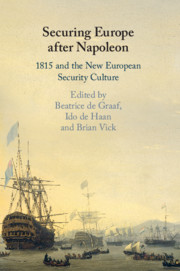Book contents
- Securing Europe after Napoleon
- Securing Europe after Napoleon
- Copyright page
- Contents
- Contributors
- Vienna 1815
- Part I Conceptualisations
- Part II Institutions and Interests
- 4 The Central Commission for the Navigation of the Rhine
- 5 From the Balance of Power to a Balance of Diplomacy?
- 6 The London Ambassadors’ Conferences and Beyond
- 7 The Allied Machine
- 8 The German Confederation
- Part III Threats
- Part IV Agents and Practices
- Index
4 - The Central Commission for the Navigation of the Rhine
A First Step towards European Economic Security?
from Part II - Institutions and Interests
Published online by Cambridge University Press: 25 January 2019
- Securing Europe after Napoleon
- Securing Europe after Napoleon
- Copyright page
- Contents
- Contributors
- Vienna 1815
- Part I Conceptualisations
- Part II Institutions and Interests
- 4 The Central Commission for the Navigation of the Rhine
- 5 From the Balance of Power to a Balance of Diplomacy?
- 6 The London Ambassadors’ Conferences and Beyond
- 7 The Allied Machine
- 8 The German Confederation
- Part III Threats
- Part IV Agents and Practices
- Index
Summary
This chapter investigates how economic interests played a role in the European security culture of the nineteenth century. At the Congress of Vienna, the principle of freedom of navigation of international rivers became institutionalised in the first intergovernmental organisation of modern history: the Central Commission for the Navigation of the Rhine (CCNR). Beyond the context of territorial demarcation during peace negotiations, the monitoring of – literally – rival interests became embedded in contemporary liberal theories of free commercial navigation as a precondition for international peace and security. This was the context in which the CCNR became the institutional framework within which conflicting interests converged in a form of international institutional cooperation that is still effective today.
Keywords
- Type
- Chapter
- Information
- Securing Europe after Napoleon1815 and the New European Security Culture, pp. 75 - 94Publisher: Cambridge University PressPrint publication year: 2019
- 1
- Cited by

